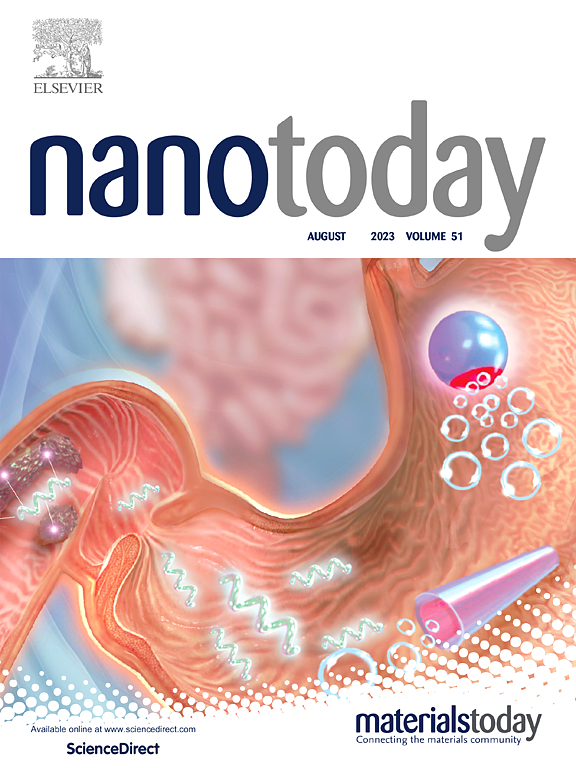MCL1 inhibitor S63845 delivered by follicle-stimulating hormone modified liposome potentiates carboplatin efficacy in ovarian cancer
IF 13.2
1区 材料科学
Q1 CHEMISTRY, MULTIDISCIPLINARY
引用次数: 0
Abstract
Platinum resistance cause therapeutic failure and poor prognosis in ovarian cancer, and evasion of apoptosis is a critical factor in chemoresistance. A limited number of FDA-approved anticancer drugs directly target apoptotic pathways. Here, we discovered that MCL1, a critical anti-apoptotic protein, is amplified and associated with platinum resistance and survival in ovarian cancer, assisting in personalized treatment. We further identified S63845 through drug-based screening, the most potent MCL1 inhibitor, which efficiently enhanced carboplatin (CBP) sensitivity in various ovarian cancer models, including primary ovarian cancer cells, orthotopic ovarian cancer, peritoneal metastasis, and human patient-derived xenograft (PDX) models. Mechanistically, S63845 competitively binds to MCL1, disrupts the binding of apoptosis effector (BAK and BAX) or pro-apoptotic BH3 protein (BIM) to MCL1 respectively, and eventually enhances CBP-induced apoptosis.To promote the clinical transformation of S63845, we developed follicle-stimulating hormone-modified liposome nanoparticles (S63845@Lipo-FSH) to enhance stability, membrane penetration, and tumor-targeting capabilities. S63845@Lipo-FSH exhibits a superior therapeutic efficacy and tumor targeting compared to free S63845, even when the dose of S63845 is reduced to one-fifth. Overall, targeting MCL1 by S63845@Lipo-FSH enhances CBP efficiency in ovarian cancer, with safety and efficacy, suggesting that this strategy is effective and promising for clinical application.
通过卵泡刺激素修饰脂质体递送的 MCL1 抑制剂 S63845 可增强卡铂对卵巢癌的疗效
铂类药物的耐药性会导致卵巢癌治疗失败和预后不良,而细胞凋亡的逃避是导致化疗耐药性的关键因素。美国 FDA 批准的抗癌药物中,直接针对细胞凋亡通路的药物数量有限。在这里,我们发现卵巢癌中关键的抗凋亡蛋白MCL1被扩增,并与铂类药物耐药性和生存率相关,这有助于个性化治疗。我们通过药物筛选进一步确定了 S63845,它是最有效的 MCL1 抑制剂,能有效提高卡铂(CBP)在各种卵巢癌模型中的敏感性,包括原发性卵巢癌细胞、正位卵巢癌、腹膜转移瘤和人类患者来源异种移植(PDX)模型。为促进S63845的临床转化,我们开发了卵泡刺激素修饰的脂质体纳米颗粒(S63845@Lipo-FSH),以增强其稳定性、膜穿透性和肿瘤靶向能力。与游离 S63845 相比,即使 S63845 的剂量减少到五分之一,S63845@脂质-FSH 也能显示出更优越的疗效和肿瘤靶向性。总之,S63845@Lipo-FSH靶向MCL1能提高CBP对卵巢癌的治疗效率,而且安全有效,表明这种策略是有效的,具有临床应用前景。
本文章由计算机程序翻译,如有差异,请以英文原文为准。
求助全文
约1分钟内获得全文
求助全文
来源期刊

Nano Today
工程技术-材料科学:综合
CiteScore
21.50
自引率
3.40%
发文量
305
审稿时长
40 days
期刊介绍:
Nano Today is a journal dedicated to publishing influential and innovative work in the field of nanoscience and technology. It covers a wide range of subject areas including biomaterials, materials chemistry, materials science, chemistry, bioengineering, biochemistry, genetics and molecular biology, engineering, and nanotechnology. The journal considers articles that inform readers about the latest research, breakthroughs, and topical issues in these fields. It provides comprehensive coverage through a mixture of peer-reviewed articles, research news, and information on key developments. Nano Today is abstracted and indexed in Science Citation Index, Ei Compendex, Embase, Scopus, and INSPEC.
 求助内容:
求助内容: 应助结果提醒方式:
应助结果提醒方式:


